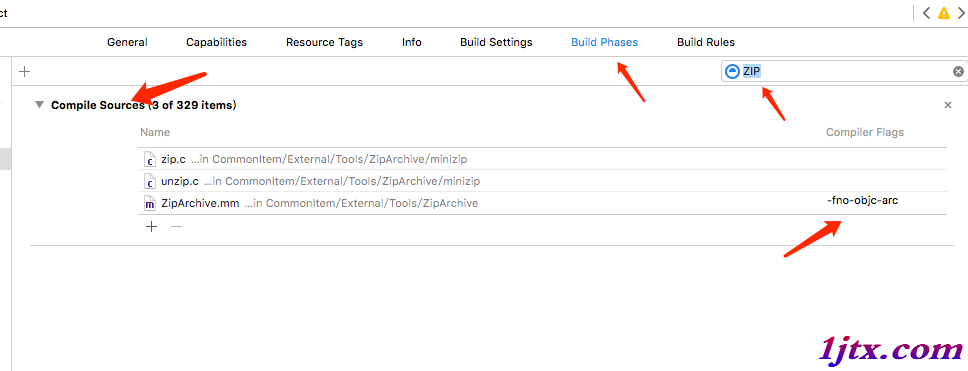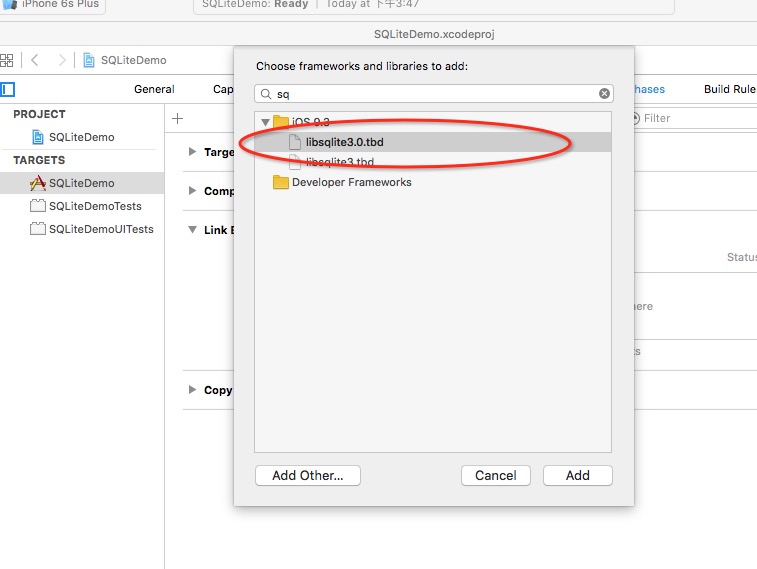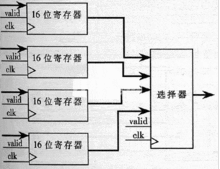IOS本地日志記錄方案
此篇文章將要介紹IOS本地日志記錄方案的相關內容,具體內容請看下面
我們在項目中日志記錄這塊也算是比較重要的,有時候用戶程序出什麼問題,光靠服務器的日志還不能准確的找到問題。
現在一般記錄日志有幾種方式:1、使用第三方工具來記錄日志,如騰訊的Bugly,它是只把程序的異常日志,程序崩潰日志,以及一些自定義的操作日志上傳到Bugly的後台
2、我們把日志記錄到本地,在適合的時候再上傳到服務器
這裡我要介紹的是第二種方法,第一種和第二種可以一起用。
假如現在有下面這樣的日志記錄要求1、日志記錄在本地
2、日志最多記錄N天,N天之前的都需要清理掉
3、日志可以上傳到服務器,由服務器控制是否需要上傳
4、上傳的日志應該壓縮後再上傳
實現思路1、日志記錄在本地
也就是把字符串保存到本地,我們可以用 將NSString轉換成NSData然後寫入本地,但是NSData寫入本地會對本地的文件進入覆蓋,所以我們只有當文件不存在的時候第一次寫入的時候用這種方式,如果要將日志內容追加到日志文件裡面,我們可以用NSFleHandle來處理
2、日志最多記錄N天,N天之前的都需要清理掉
這個就比較容易了,我們可以將本地日志文件名定成當天日期,每天一個日志文件,這樣我們在程序啟動後,可以去檢測並清理掉過期的日志文件
3、日志可以上傳到服務器,由服務器控制是否需要上傳
這個功能我們需要後台的配合,後台需要提供兩個接口,一個是APP去請求時返回當前應用是否需要上傳日志,根據參數來判斷,第二個接口就是上傳日志的接口
4、上傳的日志應該壓縮後再上傳
一般壓縮的功能我們可以使用zip壓縮,OC中有開源的插件 ZipArchive 地址:http://code.google.com/p/ziparchive/ (需要FQ)
具體實現代碼我們先將ZipArchive引入到項目中,注意還需要引入系統的 libz.tbd 動態庫,好下:


由於ZipArchive是使用C++編寫的,是不支持ARC的,所以我們需要在項目中把這個類的ARC關閉掉,不然會編譯不通過,如下:

給ZipArchive.mm文件添加一個-fno-objc-arc 標簽就可以了
然後就是代碼部分了,創建一個日志工具類,LogManager
// // LogManager.h // LogFileDemo // // Created by xgao on 17/3/9. // Copyright © 2017年 xgao. All rights reserved. // #import <Foundation/Foundation.h> @interface LogManager : NSObject /** * 獲取單例實例 * * @return 單例實例 */ + (instancetype) sharedInstance; #pragma mark - Method /** * 寫入日志 * * @param module 模塊名稱 * @param logStr 日志信息,動態參數 */ - (void)logInfo:(NSString*)module logStr:(NSString*)logStr, ...; /** * 清空過期的日志 */ - (void)clearExpiredLog; /** * 檢測日志是否需要上傳 */ - (void)checkLogNeedUpload; @end
//
// LogManager.m
// LogFileDemo
//
// Created by xgao on 17/3/9.
// Copyright © 2017年 xgao. All rights reserved.
//
#import "LogManager.h"
#import "ZipArchive.h"
#import "X.networking.h"
// 日志保留最大天數
static const int LogMaxSaveDay = 7;
// 日志文件保存目錄
static const NSString* LogFilePath = @"/Documents/OTKLog/";
// 日志壓縮包文件名
static NSString* ZipFileName = @"OTKLog.zip";
@interface LogManager()
// 日期格式化
@property (nonatomic,retain) NSDateFormatter* dateFormatter;
// 時間格式化
@property (nonatomic,retain) NSDateFormatter* timeFormatter;
// 日志的目錄路徑
@property (nonatomic,copy) NSString* basePath;
@end
@implementation LogManager
/**
* 獲取單例實例
*
* @return 單例實例
*/
+ (instancetype) sharedInstance{
static LogManager* instance = nil;
static dispatch_once_t onceToken;
dispatch_once(&onceToken, ^{
if (!instance) {
instance = [[LogManager alloc]init];
}
});
return instance;
}
// 獲取當前時間
+ (NSDate*)getCurrDate{
NSDate *date = [NSDate date];
NSTimeZone *zone = [NSTimeZone systemTimeZone];
NSInteger interval = [zone secondsFromGMTForDate: date];
NSDate *localeDate = [date dateByAddingTimeInterval: interval];
return localeDate;
}
#pragma mark - Init
- (instancetype)init{
self = [super init];
if (self) {
// 創建日期格式化
NSDateFormatter* dateFormatter = [[NSDateFormatter alloc]init];
[dateFormatter setDateFormat:@"yyyy-MM-dd"];
// 設置時區,解決8小時
[dateFormatter setTimeZone:[NSTimeZone timeZoneWithAbbreviation:@"UTC"]];
self.dateFormatter = dateFormatter;
// 創建時間格式化
NSDateFormatter* timeFormatter = [[NSDateFormatter alloc]init];
[timeFormatter setDateFormat:@"HH:mm:ss"];
[timeFormatter setTimeZone:[NSTimeZone timeZoneWithAbbreviation:@"UTC"]];
self.timeFormatter = timeFormatter;
// 日志的目錄路徑
self.basePath = [NSString stringWithFormat:@"%@%@",NSHomeDirectory(),LogFilePath];
}
return self;
}
#pragma mark - Method
/**
* 寫入日志
*
* @param module 模塊名稱
* @param logStr 日志信息,動態參數
*/
- (void)logInfo:(NSString*)module logStr:(NSString*)logStr, ...{
#pragma mark - 獲取參數
NSMutableString* parmaStr = [NSMutableString string];
// 聲明一個參數指針
va_list paramList;
// 獲取參數地址,將paramList指向logStr
va_start(paramList, logStr);
id arg = logStr;
@try {
// 遍歷參數列表
while (arg) {
[parmaStr appendString:arg];
// 指向下一個參數,後面是參數類似
arg = va_arg(paramList, NSString*);
}
} @catch (NSException *exception) {
[parmaStr appendString:@"【記錄日志異常】"];
} @finally {
// 將參數列表指針置空
va_end(paramList);
}
#pragma mark - 寫入日志
// 異步執行
dispatch_async(dispatch_queue_create("writeLog", nil), ^{
// 獲取當前日期做為文件名
NSString* fileName = [self.dateFormatter stringFromDate:[NSDate date]];
NSString* filePath = [NSString stringWithFormat:@"%@%@",self.basePath,fileName];
// [時間]-[模塊]-日志內容
NSString* timeStr = [self.timeFormatter stringFromDate:[LogManager getCurrDate]];
NSString* writeStr = [NSString stringWithFormat:@"[%@]-[%@]-%@\n",timeStr,module,parmaStr];
// 寫入數據
[self writeFile:filePath stringData:writeStr];
NSLog(@"寫入日志:%@",filePath);
});
}
/**
* 清空過期的日志
*/
- (void)clearExpiredLog{
// 獲取日志目錄下的所有文件
NSArray* files = [[NSFileManager defaultManager] contentsOfDirectoryAtPath:self.basePath error:nil];
for (NSString* file in files) {
NSDate* date = [self.dateFormatter dateFromString:file];
if (date) {
NSTimeInterval oldTime = [date timeIntervalSince1970];
NSTimeInterval currTime = [[LogManager getCurrDate] timeIntervalSince1970];
NSTimeInterval second = currTime - oldTime;
int day = (int)second / (24 * 3600);
if (day >= LogMaxSaveDay) {
// 刪除該文件
[[NSFileManager defaultManager] removeItemAtPath:[NSString stringWithFormat:@"%@/%@",self.basePath,file] error:nil];
NSLog(@"[%@]日志文件已被刪除!",file);
}
}
}
}
/**
* 檢測日志是否需要上傳
*/
- (void)checkLogNeedUpload{
__block NSError* error = nil;
// 獲取實體字典
__block NSDictionary* resultDic = nil;
// 請求的URL,後台功能需要自己做
NSString* url = [NSString stringWithFormat:@"%@/common/phone/logs",SERVIERURL];
// 發起請求,從服務器上獲取當前應用是否需要上傳日志
[[X.networking sharedInstance] get:url success:^(NSString* jsonData) {
// 獲取實體字典
NSDictionary* dataDic = [Utilities getDataString:jsonData error:&error];
resultDic = dataDic.count > 0 ? [dataDic objectForKey:@"data"] : nil;
if([resultDic isEqual:[NSNull null]]){
error = [NSError errorWithDomain:[NSString stringWithFormat:@"請求失敗,data沒有數據!"] code:500 userInfo:nil];
}
// 完成後的處理
if (error == nil) {
// 處理上傳日志
[self uploadLog:resultDic];
}else{
LOGERROR(@"檢測日志返回結果有誤!data沒有數據!");
}
} faild:^(NSString *errorInfo) {
LOGERROR(([NSString stringWithFormat:@"檢測日志失敗!%@",errorInfo]));
}];
}
#pragma mark - Private
/**
* 處理是否需要上傳日志
*
* @param resultDic 包含獲取日期的字典
*/
- (void)uploadLog:(NSDictionary*)resultDic{
if (!resultDic) {
return;
}
// 0不拉取,1拉取N天,2拉取全部
int type = [resultDic[@"type"] intValue];
// 壓縮文件是否創建成功
BOOL created = NO;
if (type == 1) {
// 拉取指定日期的
// "dates": ["2017-03-01", "2017-03-11"]
NSArray* dates = resultDic[@"dates"];
// 壓縮日志
created = [self compressLog:dates];
}else if(type == 2){
// 拉取全部
// 壓縮日志
created = [self compressLog:nil];
}
if (created) {
// 上傳
[self uploadLogToServer:^(BOOL boolValue) {
if (boolValue) {
LOGINFO(@"日志上傳成功---->>");
// 刪除日志壓縮文件
[self deleteZipFile];
}else{
LOGERROR(@"日志上傳失敗!!");
}
} errorBlock:^(NSString *errorInfo) {
LOGERROR(([NSString stringWithFormat:@"日志上傳失敗!!Error:%@",errorInfo]));
}];
}
}
/**
* 壓縮日志
*
* @param dates 日期時間段,空代表全部
*
* @return 執行結果
*/
- (BOOL)compressLog:(NSArray*)dates{
// 先清理幾天前的日志
[self clearExpiredLog];
// 獲取日志目錄下的所有文件
NSArray* files = [[NSFileManager defaultManager] contentsOfDirectoryAtPath:self.basePath error:nil];
// 壓縮包文件路徑
NSString * zipFile = [self.basePath stringByAppendingString:ZipFileName] ;
ZipArchive* zip = [[ZipArchive alloc] init];
// 創建一個zip包
BOOL created = [zip CreateZipFile2:zipFile];
if (!created) {
// 關閉文件
[zip CloseZipFile2];
return NO;
}
if (dates) {
// 拉取指定日期的
for (NSString* fileName in files) {
if ([dates containsObject:fileName]) {
// 將要被壓縮的文件
NSString *file = [self.basePath stringByAppendingString:fileName];
// 判斷文件是否存在
if ([[NSFileManager defaultManager] fileExistsAtPath:file]) {
// 將日志添加到zip包中
[zip addFileToZip:file newname:fileName];
}
}
}
}else{
// 全部
for (NSString* fileName in files) {
// 將要被壓縮的文件
NSString *file = [self.basePath stringByAppendingString:fileName];
// 判斷文件是否存在
if ([[NSFileManager defaultManager] fileExistsAtPath:file]) {
// 將日志添加到zip包中
[zip addFileToZip:file newname:fileName];
}
}
}
// 關閉文件
[zip CloseZipFile2];
return YES;
}
/**
* 上傳日志到服務器
*
* @param returnBlock 成功回調
* @param errorBlock 失敗回調
*/
- (void)uploadLogToServer:(BoolBlock)returnBlock errorBlock:(ErrorBlock)errorBlock{
__block NSError* error = nil;
// 獲取實體字典
__block NSDictionary* resultDic;
// 訪問URL
NSString* url = [NSString stringWithFormat:@"%@/fileupload/fileupload/logs",SERVIERURL_FILE];
// 發起請求,這裡是上傳日志到服務器,後台功能需要自己做
[[X.networking sharedInstance] upload:url fileData:nil fileName:ZipFileName mimeType:@"application/zip" parameters:nil success:^(NSString *jsonData) {
// 獲取實體字典
resultDic = [Utilities getDataString:jsonData error:&error];
// 完成後的處理
if (error == nil) {
// 回調返回數據
returnBlock([resultDic[@"state"] boolValue]);
}else{
if (errorBlock){
errorBlock(error.domain);
}
}
} faild:^(NSString *errorInfo) {
returnBlock(errorInfo);
}];
}
/**
* 刪除日志壓縮文件
*/
- (void)deleteZipFile{
NSString* zipFilePath = [self.basePath stringByAppendingString:ZipFileName];
if ([[NSFileManager defaultManager] fileExistsAtPath:zipFilePath]) {
[[NSFileManager defaultManager] removeItemAtPath:zipFilePath error:nil];
}
}
/**
* 寫入字符串到指定文件,默認追加內容
*
* @param filePath 文件路徑
* @param stringData 待寫入的字符串
*/
- (void)writeFile:(NSString*)filePath stringData:(NSString*)stringData{
// 待寫入的數據
NSData* writeData = [stringData dataUsingEncoding:NSUTF8StringEncoding];
// NSFileManager 用於處理文件
BOOL createPathOk = YES;
if (![[NSFileManager defaultManager] fileExistsAtPath:[filePath stringByDeletingLastPathComponent] isDirectory:&createPathOk]) {
// 目錄不存先創建
[[NSFileManager defaultManager] createDirectoryAtPath:[filePath stringByDeletingLastPathComponent] withIntermediateDirectories:YES attributes:nil error:nil];
}
if(![[NSFileManager defaultManager] fileExistsAtPath:filePath]){
// 文件不存在,直接創建文件並寫入
[writeData writeToFile:filePath atomically:NO];
}else{
// NSFileHandle 用於處理文件內容
// 讀取文件到上下文,並且是更新模式
NSFileHandle* fileHandler = [NSFileHandle fileHandleForUpdatingAtPath:filePath];
// 跳到文件末尾
[fileHandler seekToEndOfFile];
// 追加數據
[fileHandler writeData:writeData];
// 關閉文件
[fileHandler closeFile];
}
}
@end
日志工具的使用
1、記錄日志
[[LogManager sharedInstance] logInfo:@"首頁" logStr:@"這是日志信息!",@"可以多參數",nil];
2、我們在程序啟動後,進行一次檢測,看要不要上傳日志
// 幾秒後檢測是否有需要上傳的日志
[[LogManager sharedInstance] performSelector:@selector(checkLogNeedUpload) withObject:nil afterDelay:3];
這裡可能有人發現我們在記錄日志的時候為什麼最後面要加上nil,因為這個是OC中動態參數的結束後綴,不加上nil,程序就不知道你有多少個參數,可能有人又要說了,NSString的stringWithFormat 方法為什麼不需要加 nil 也可以呢,那是因為stringWithFormat裡面用到了占位符,就是那些 %@ %i 之類的,這樣程序就能判斷你有多少個參數了,所以就不用加 nil 了
看到這裡,可能大家覺得這個記錄日志的方法有點長,後面還加要nil,不方便,那能不能再優化一些,讓它更簡單的調用呢?我可以用到宏來優化,我們這樣定義一個宏,如下:
// 記錄本地日志 #define LLog(module,...) [[LogManager sharedInstance] logInfo:module logStr:__VA_ARGS__,nil]
這樣我們使用的時候就方便了,這樣調用就行了。
LLog(@"首頁", @"這是日志信息!",@"可以多參數");
好的,那本文就結束了,這也是將我工作中用的的分享給大家,老鳥就可以飛過了~~有什麼看不明白的就留言吧。
[db:作者簡介][db:原文翻譯及解析]【IOS本地日志記錄方案】的相關資料介紹到這裡,希望對您有所幫助! 提示:不會對讀者因本文所帶來的任何損失負責。如果您支持就請把本站添加至收藏夾哦!
- 上一頁:CoreAnimation 圖層幾何學
- 下一頁:關於極光推送需要注意的幾點




